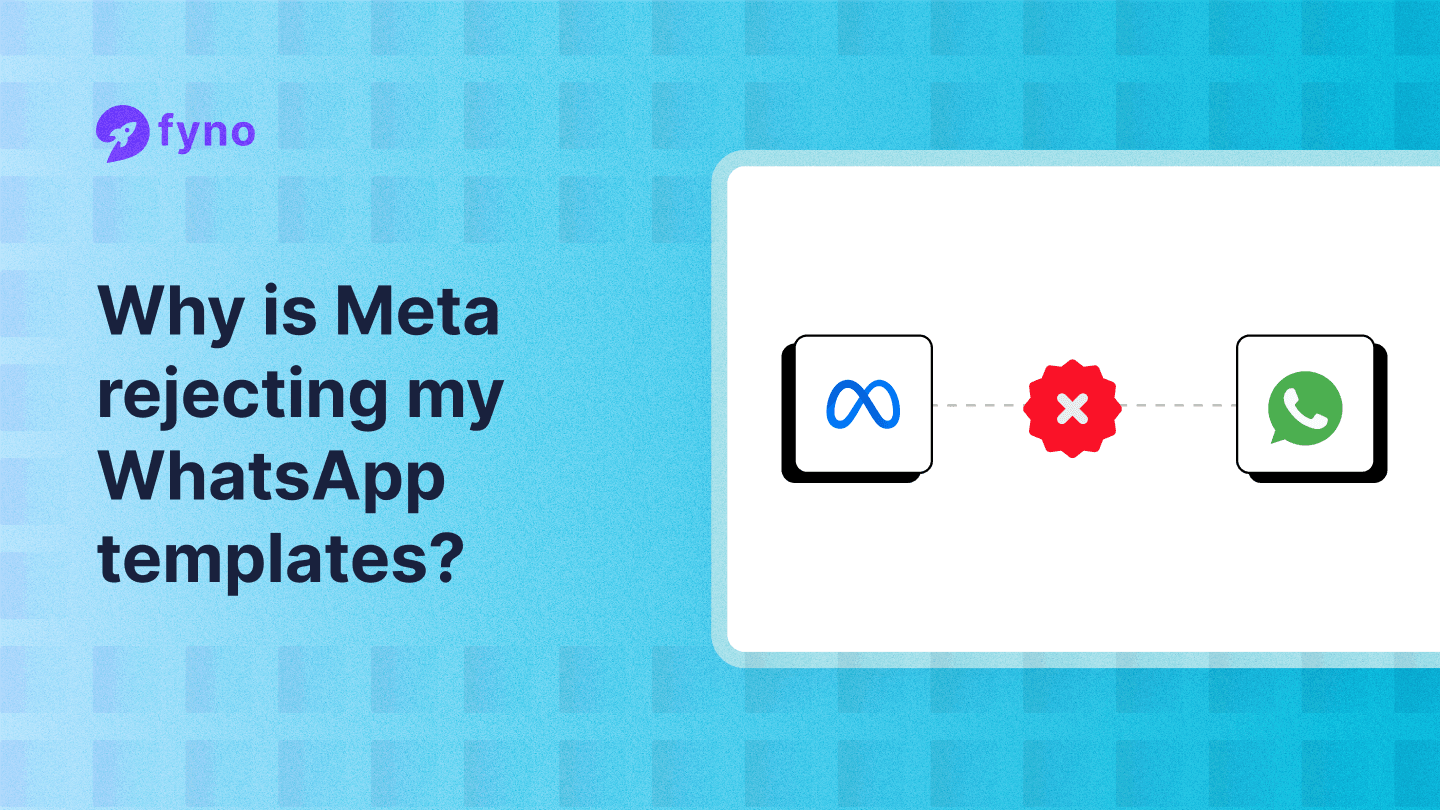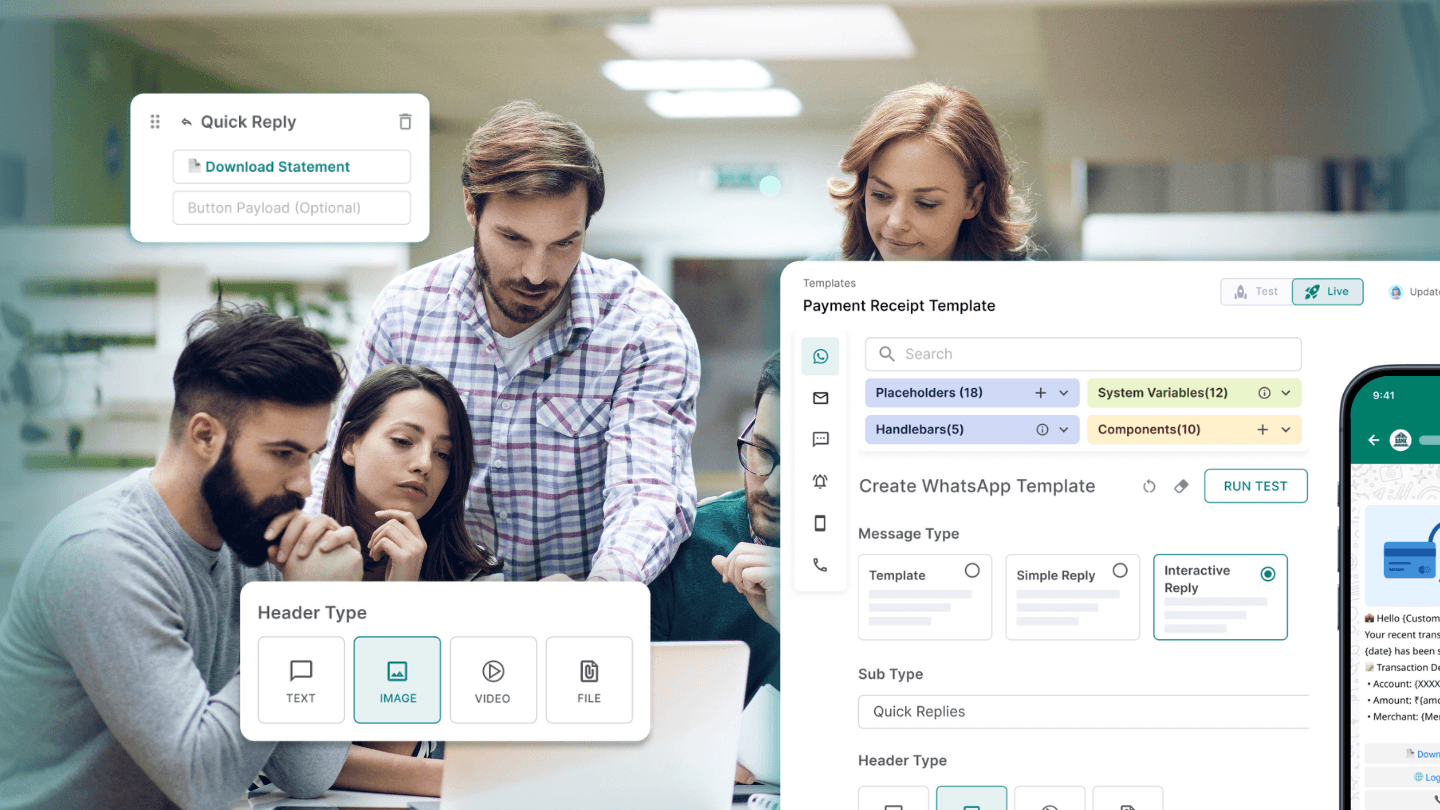As a business owner, getting your customer communication message templates approved can feel like a wild goose chase. Whether it's navigating the complexities of SMS DLT registrations or meeting the precise requirements of WhatsApp, the process is anything but straightforward. It's a bit like trying to score a goal in the dark — you’re never quite sure if you’re going to hit the mark.
For SMS, you have to register your entity, submit detailed templates, and then wait... and wait... and wait. Sometimes, you’re waiting so long you forget what you were even waiting for. And when the verdict finally arrives, it often means going back to square one, reworking your message, and crossing your fingers for better luck next time.
But if you think SMS approvals are tough, wait until you hear about WhatsApp. With WhatsApp, it’s all about user experience. The process might be quicker — thanks to Meta’s clever algorithms, but that doesn’t mean it’s easier. One small mistake, like a misplaced variable or a too-generic phrase, and your template is out.
Why all the hassle? Meta’s rules are there to stop spam and make sure every message is worth the read. For businesses, though, it often feels like they’re playing a guessing game with the odds stacked against them.
But there’s good news. As a Meta tech partner, Fyno has the insider knowledge to help you get your templates approved. We’ve seen the common pitfalls and know the strategies to get past them.
In this blog, we’ll break down the WhatsApp template approval process and share some top tips to help you succeed. Let’s dive in and turn those frustrating rejections into easy wins. Shall we?

What is a WhatsApp Business template?
Think of WhatsApp Business Templates as pre-written scripts for bulk messages. They ensure your communication is clear, relevant, and avoids spamming users. But, just like scripts, they need to follow specific rules.
Common reasons for rejection
- Dishonesty: Avoid misleading claims or offers that sound too good to be true.
- Pure promotion: While promoting is okay, templates shouldn't solely focus on selling. Offer value to your customers.
- Confusion or irrelevant content: Keep it simple and focus on content relevant to the customer's interaction with your business.
- Term violations: Hate speech, harassment, or anything illegal is a no-go.
- Formatting errors: Templates have a specific structure. Double-check for any mistakes.
Tips for creating approved templates
- Clarity is key: Avoid jargon and use clear, concise language.
- Offer value: Provide something useful, like information, reminders, or relevant promotions.
- Test before sending: Use WhatsApp's testing tool to catch any errors.
- Read the rules: Familiarize yourself with Meta's template guidelines.
Beyond the basics: Category confusion
Another common issue is miscategorizing your template. This can lead to pricing and delivery problems.
- Marketing vs. Utility: If your template promotes products or services, it's likely "Marketing." "Utility" templates are for helpful information.
- Authentication: Verification codes, password resets, and account activation templates belong under "Authentication."
Understanding the appeal process
When your WhatsApp Business Template is rejected, you can often find the specific reason for the rejection within the Business Support Home section of your Meta account. This platform provides valuable insights into why your template didn't meet Meta's guidelines.
If you don't have direct access to the Meta WhatsApp Manager, we recommend you to work directly with a Meta tech partner to ease this out. This will help you bypass the long queues that you might otherwise have to deal with working with a Business Service Provider (BSP).
Recommended Read: Benefits of working with a Meta tech partner vs BSP
Steps to appeal a template rejection
- Review the rejection reason: Carefully examine the reason provided in the Business Support Home or as communicated by your BSP. Understanding the specific issue will help you tailor your appeal effectively.
- Gather evidence: Collect any relevant evidence to support your appeal, such as:
- A screenshot or copy of the rejected template
- Relevant WhatsApp guidelines or policies
- Case studies or examples of similar templates that were approved
- Any correspondence with Meta or your BSP regarding the template
- Identify the issue: Clearly articulate the specific issue you believe led to the rejection. Be as detailed as possible and explain why you think the template meets WhatsApp's guidelines.
- Provide a detailed explanation: Explain why you believe the template should be approved, addressing the specific concerns raised in the rejection notice. Use clear and concise language to present your case.
- Submit the appeal: Access the Business Support Home page on Meta's website and follow these instructions for submitting an appeal. If you don't have direct access to the Business Support Home, contact your BSP for assistance.
- Be patient and persistent: The appeal process may take some time, so be patient and persistent. If you don't receive a response within a reasonable timeframe, follow up with Meta's support team or your BSP.
Additional tips
- Be polite and respectful: Avoid using aggressive or confrontational language in your appeal.
- Provide as much information as possible: The more evidence and explanation you can provide, the stronger your appeal will be.
- Learn from the feedback: Even if your appeal is unsuccessful, carefully review the feedback provided by Meta or your BSP to improve your future templates.
By following these steps and providing a strong appeal, you can increase your chances of having your WhatsApp template approved. Remember, persistence and a well-crafted appeal can make a significant difference.
FAQs
- What is a WhatsApp Business Template?
A WhatsApp Business Template is a pre-approved message format that businesses use to send bulk messages to customers. These templates must adhere to specific guidelines set by WhatsApp to ensure the content is relevant, clear, and not spammy. - What are the different types of WhatsApp Business templates?
WhatsApp Business templates are categorized into three main types: Marketing, Utility, and Authentication. - Why was my WhatsApp template rejected?
Your template might have been rejected due to reasons such as misleading claims, purely promotional content, confusing or irrelevant messages, violation of terms (like hate speech or illegal content), or formatting errors. It’s important to review WhatsApp’s guidelines to avoid these pitfalls. - How long does it take for a template to get approved?
The approval process for a WhatsApp template usually takes a few minutes or hours to sometimes, a couple of days. However, the timeline can vary based on the volume of submissions and the complexity of the template content. - What should I do if my template is rejected?
If your template is rejected, review the rejection reason provided in the Business Support Home section of your Meta account. Make the necessary adjustments to your template, ensuring it aligns with WhatsApp's guidelines, and then resubmit it for approval.
- Can I appeal a rejected WhatsApp template?
Yes, you can appeal a rejected WhatsApp template. To do this, review the rejection reason, gather evidence to support your appeal, and submit it through the Business Support Home page on Meta's website. If you don't have direct access, you can work with a Meta tech partner for assistance. - What are some tips for getting my templates approved?
To increase the chances of approval, ensure your template is clear and concise, offers value to the recipient, and follows WhatsApp's guidelines. Avoid using jargon, test the template before submission, and double-check for any formatting errors. - How can Fyno help with the template approval process?
As a Meta tech partner, Fyno has the expertise to guide businesses through the template approval process. We understand the common reasons for rejection and can help you create compliant templates, increasing your chances of approval.


